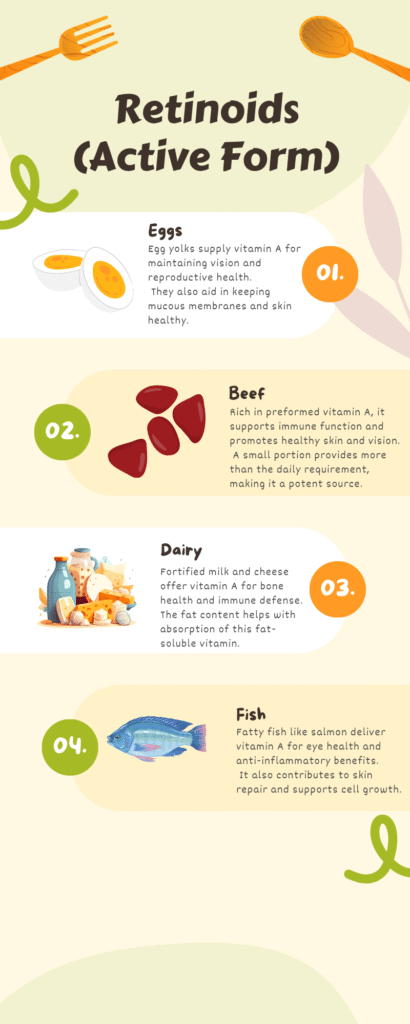
Introduction: The Power of Vitamin A
When we think of essential vitamins, Vitamin C often steals the spotlight, but Vitamin A is just as important, if not more. Known as the “vision vitamin,” Vitamin A plays a vital role in keeping our eyes sharp, our skin youthful, our immune system strong, and our body’s development on track. Without it, even the most basic body functions suffer. Imagine trying to drive at night with headlights that don’t work that’s how your body feels without enough Vitamin A. In this article, we’ll uncover why Vitamin A is so crucial, where to get it, and how to maintain the perfect balance.
Want to dive deeper into the science and health perks of this nutrient? Check out our detailed guide on Vitamin A Benefits for more insights.
What is Vitamin A?
Definition and Classification
Vitamin A is a fat-soluble vitamin that your body cannot produce on its own, so it must be obtained from diet. Being fat-soluble means it gets stored in the liver and released as needed, unlike water-soluble vitamins that leave the body quickly.
Retinoids (Active Form)
These are preformed Vitamin A found in animal products such as liver, fish, dairy, and eggs. Retinoids are ready-to-use forms of Vitamin A that the body can absorb directly.

Carotenoids (Precursor Form)
These are plant pigments, such as beta-carotene in carrots and sweet potatoes, that your body converts into active Vitamin A. Carotenoids also act as antioxidants, adding extra health benefits.

How Vitamin A Works in the Body
Vitamin A works at the cellular level. Here’s how:
- Stored in the liver: About 80 to 90% of the Vitamin A you consume is stored in your liver.
- Released into the bloodstream: When your body needs it, Vitamin A binds to proteins and is transported through the bloodstream to target organs.
- Converted from carotenoids: Your body cleverly converts plant-based carotenoids into usable retinol, ensuring flexibility in dietary sources.
This system ensures that you don’t run out of this crucial nutrient even if you don’t consume it daily.
Vitamin A and Eye Health
Vitamin A is synonymous with good vision.
- Retinal function: It helps form rhodopsin, a pigment in your eyes that allows you to see in low light. Without it, night vision deteriorates.
- Night blindness prevention: One of the earliest signs of Vitamin A deficiency is trouble seeing at night.
- Age-related vision protection: Adequate Vitamin A slows down the progression of age-related macular degeneration, a leading cause of blindness in older adults.
Vitamin A and the Immune System
Think of Vitamin A as your body’s natural shield.
- Strengthening natural barriers: It maintains the health of your skin and mucous membranes, which act as a first defense line against pathogens.
- Supporting white blood cell function: It ensures your immune cells can detect and fight infections effectively.
- Preventing infections in children: Studies show that children with adequate Vitamin A are less likely to suffer from respiratory infections, measles, and diarrhea.
Vitamin A and Skin Health
Ever wondered why retinol creams are popular? It’s because Vitamin A is at the heart of skincare.
- Repairing skin tissues: It helps repair damaged skin and speeds up wound healing.
- Reducing acne: Vitamin A reduces oil production and inflammation, minimizing acne flare-ups.
- Anti-aging properties: Retinoids derived from Vitamin A stimulate collagen production, reducing fine lines and wrinkles.
Reproductive Health Benefits
Vitamin A plays a subtle yet powerful role in fertility and reproduction.
- In men: It supports sperm production and motility.
- In women: It regulates menstrual cycles and supports egg health.
- During pregnancy: Adequate Vitamin A ensures proper development of the fetus heart, lungs, kidneys, and eyes.
Vitamin A and Child Development
Children depend heavily on Vitamin A for healthy growth.
- Organ formation during pregnancy: Deficiency in mothers can lead to birth defects.
- Bone growth: It helps in proper bone development and strength in children.
- Reducing childhood mortality: Vitamin A supplementation programs in developing countries have drastically lowered child mortality rates.
Food Sources of Vitamin A
Getting Vitamin A is simple if you eat a diverse diet.
Vitamin A Food Sources
Grouped by type: animal-based, plant-based, and fortified foods.
| Category | Foods | Notes |
|---|---|---|
| Animal-based |
|
Rich in preformed vitamin A (retinol). |
| Plant-based |
|
High in provitamin A carotenoids. |
| Fortified foods |
|
Added vitamin A to help reduce deficiency rates. |
Daily Recommended Intake (RDA)
- Men: 900 mcg (micrograms)
- Women: 700 mcg
- Children: 300–600 mcg depending on age
- Pregnant Women: 770 mcg
- Breastfeeding Women: 1,200–1,300 mcg
Meeting these requirements through food is ideal, but supplements may be necessary in special cases.
Signs and Risks of Vitamin A Deficiency
Deficiency can be serious, especially in vulnerable populations.
- Eye-related problems: Night blindness, dry eyes, and in severe cases, complete blindness.
- Weakened immunity: Increased risk of infections, delayed healing, and respiratory issues.
- Global risk: Vitamin A deficiency is a leading cause of preventable blindness in children worldwide, especially in low-income countries.
Health Risks of Vitamin A Toxicity
Too much Vitamin A isn’t good either.
- From supplements, not food: Toxicity usually occurs from overusing supplements.
- Symptoms: Headaches, dizziness, nausea, liver damage, and brittle bones.
- Pregnancy risk: Excess intake can cause birth defects.
- Safe upper limit: For adults, the maximum safe dose is 3,000 mcg per day.
Vitamin A vs. Supplements
- Natural intake is best: Whole foods offer safer and more bioavailable Vitamin A.
- Supplements are helpful when: You have absorption issues, chronic illnesses, or documented deficiencies.
- Choosing wisely: Always consult a doctor before taking high-dose Vitamin A supplements.
Vitamin A and Chronic Diseases
Research suggests Vitamin A may reduce risks of several chronic conditions.
- Cancer prevention: Its antioxidant properties help neutralize free radicals linked to cancer.
- Heart health: It reduces oxidative stress and supports artery health.
- Lung health: Some studies link carotenoids with lower risks of lung disease, though results are mixed.
Practical Lifestyle Tips to Maintain Healthy Levels
- Eat colorful meals: Include a mix of greens, oranges, and yellows in your diet.
- Cook smartly: Light cooking helps release carotenoids, making them easier to absorb.
- Pair with fats: Since Vitamin A is fat-soluble, combine it with healthy fats like olive oil or nuts for better absorption.
- Check labels: Look for fortified foods if your diet lacks diversity.
Conclusion
Vitamin A may not be the most talked-about nutrient, but it is one of the most vital. From keeping your eyesight sharp and boosting immunity to supporting reproduction and child growth, its benefits are far-reaching. The key lies in balance getting enough from a diverse diet while avoiding excess supplementation. With mindful eating, you can unlock the full potential of Vitamin A and enjoy a healthier, stronger, and more vibrant life.
FAQ’s
Vitamin A can prevent and treat night blindness and dry eyes caused by deficiency. However, it cannot reverse blindness caused by other conditions such as cataracts, glaucoma, or genetic disorders. Its role is protective and supportive rather than corrective.
Children deficient in Vitamin A may experience stunted growth, weakened immunity, higher risk of infections, and in severe cases, permanent blindness. That’s why many countries run supplementation programs for children.
Vegetarians can meet their Vitamin A needs by consuming beta-carotene rich foods like carrots, sweet potatoes, spinach, pumpkin, and mangoes. Since carotenoids need to be converted, eating them with healthy fats helps improve absorption.
Yes, Vitamin A derivatives like retinol are widely used in creams for acne and anti-aging. However, they should be used as directed, since excessive use may cause skin irritation or sensitivity. Prescription-strength retinoids should only be used under medical guidance.
Most people can meet their Vitamin A needs through food. Supplements may be needed only if you have a medical condition, poor diet, or confirmed deficiency. Overuse can lead to toxicity, so always check with a healthcare professional before starting.
Wellness Storyteller | Holistic Lifestyle Blogger
Wellitho is a Platform is a vibrant wellness enthusiast and lifestyle blogger dedicated to exploring the intricate world of holistic health, beauty, and personal transformation. With a keen eye for emerging trends and a passion for evidence-based wellness, she transforms complex health concepts into accessible, inspiring content that empowers her readers to live their best lives.
My Wellness Philosophy
“Wellness isn’t about perfection it’s about progress, self-love, and finding joy in the journey of becoming the healthiest version of yourself.”
Areas of Passion
🌿 Holistic Health: Bridging traditional wisdom with modern scientific insights
💆 Skincare: Exploring natural and innovative beauty solutions
💪 Fitness: Sharing practical, motivational fitness tips and personal experiences
🧘 Wellness: Promoting mental and physical well-being through comprehensive lifestyle approaches
What Drives Me
My content is more than just tips and reviews it’s a genuine exploration of what it means to live a balanced, vibrant life. I believe in:
Authentic, relatable storytelling
Science-backed wellness strategies
Empowering personal transformation
Celebrating individual health journeys
